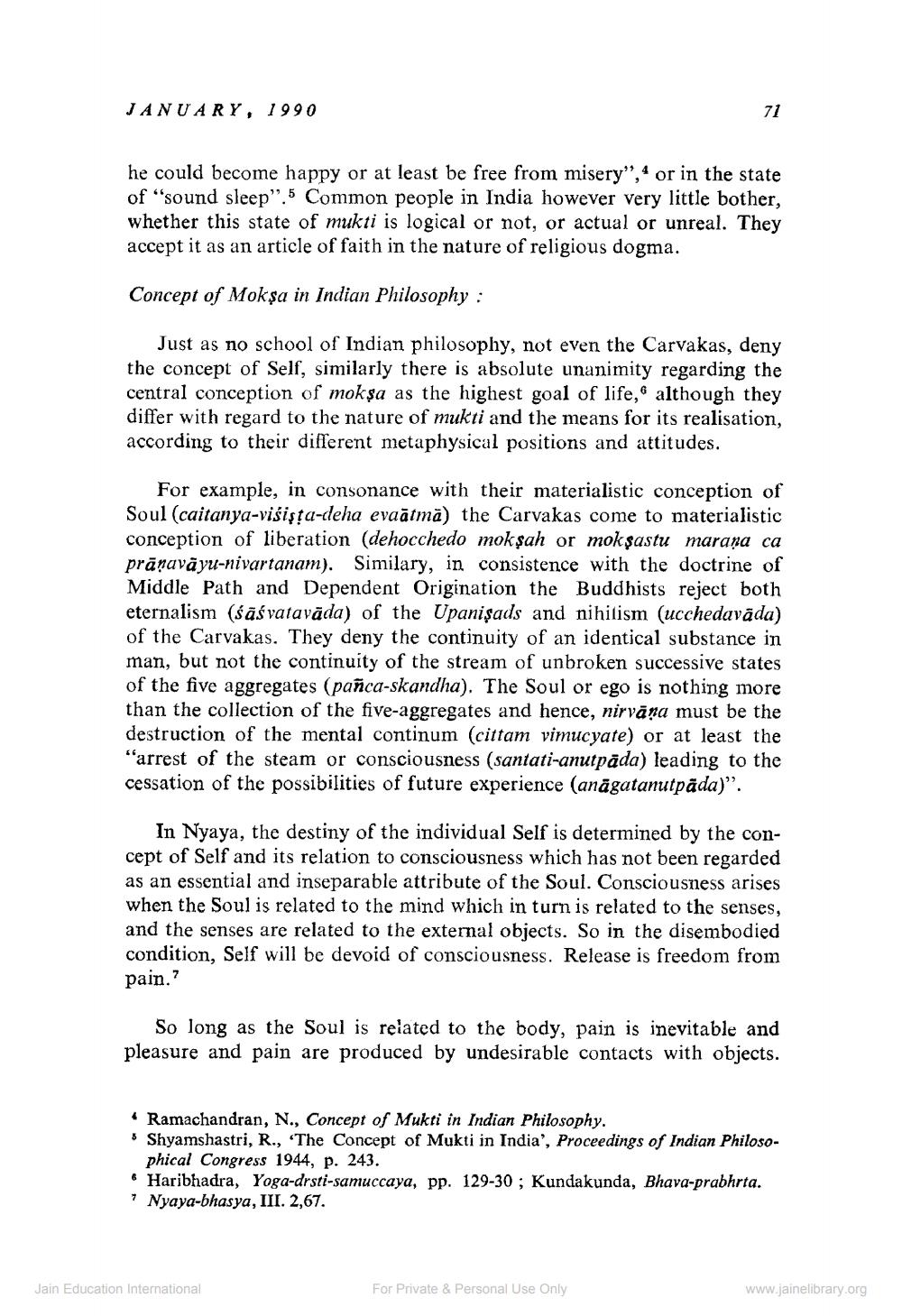Book Title: Jain Journal 1990 01 Author(s): Jain Bhawan Publication Publisher: Jain Bhawan Publication View full book textPage 8
________________ JANUARY, 1990 he could become happy or at least be free from misery”, * or in the state of "sound sleep". 5 Common people in India however very little bother, whether this state of mukti is logical or not, or actual or unreal. They accept it as an article of faith in the nature of religious dogma. Concept of Moksa in Indian Philosophy : Just as no school of Indian philosophy, not even the Carvakas, deny the concept of Self, similarly there is absolute unanimity regarding the central conception of moksa as the highest goal of life, although they differ with regard to the nature of mukti and the means for its realisation, according to their different metaphysical positions and attitudes. For example, in consonance with their materialistic conception of Soul (caitanya-višişta-deha evaātmā) the Carvakas come to materialistic conception of liberation (dehocchedo mokşah or moksastu marana ca prāņavāyu-nivartanam). Similary, in consistence with the doctrine of Middle Path and Dependent Origination the Buddhists reject both eternalism (śāśvatavāda) of the Upanişads and nihilism (ucchedavāda) of the Carvakas. They deny the continuity of an identical substance in man, but not the continuity of the stream of unbroken successive states of the five aggregates (pañca-skandha). The Soul or ego is nothing more than the collection of the five-aggregates and hence, nirvāņa must be the destruction of the mental continum (cittam vimucyate) or at least the “arrest of the steam or consciousness (santati-anutpäda) leading to the cessation of the possibilities of future experience (anāgatanutpäda)”. In Nyaya, the destiny of the individual Self is determined by the concept of Self and its relation to consciousness which has not been regarded as an essential and inseparable attribute of the Soul. Consciousness arises when the Soul is related to the mind which in turn is related to the senses, and the senses are related to the external objects. So in the disembodied condition, Self will be devoid of consciousness. Release is freedom from pain.? So long as the Soul is related to the body, pain is inevitable and pleasure and pain are produced by undesirable contacts with objects. Ramachandran, N., Concept of Mukti in Indian Philosophy. • Shyamshastri, R., The Concept of Mukti in India', Proceedings of Indian Philoso phical Congress 1944, p. 243. • Haribhadra, Yoga-drsti-samuccaya, pp. 129-30 ; Kundakunda, Bhava-prabhrta. 7 Nyaya-bhasya, III. 2,67. Jain Education International For Private & Personal Use Only www.jainelibrary.orgPage Navigation
1 ... 6 7 8 9 10 11 12 13 14 15 16 17 18 19 20 21 22 23 24 25 26 27 28 29 30 31 32 33 34 35 36 37 38 39 40 41 42 43 44 45 46 47 48 49 50 51 52 53 54 55 56 57 58 59 60 61 62 63 64 65 66 67 68 69 70 71 72 73 74 75 76 77 78 79 80 81 82
